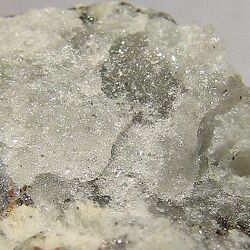Chemistry:Sanbornite
From HandWiki
Short description: Phyllosilicate mineral
| Sanbornite | |
|---|---|
 Sanbornite (white) with celsian (gray)—Incline, Maricopa County, California | |
| General | |
| Category | Phyllosilicate |
| Formula (repeating unit) | Ba(Si2O5) |
| Strunz classification | 9.EF.10 |
| Crystal system | Orthorhombic |
| Crystal class | Dipyramidal (mmm) H-M symbol: (2/m 2/m 2/m) |
| Space group | Pmcn |
| Unit cell | a = 4.62 Å, b = 7.68 Å c = 13.52 Å; Z = 4 |
| Identification | |
| Formula mass | 273.50 g/mol |
| Color | Colorless, White |
| Crystal habit | Platy modulated layers |
| Cleavage | Perfect |
| Mohs scale hardness | 5 |
| |re|er}} | Vitreous |
| Streak | White |
| Diaphaneity | Transparent to translucent |
| Specific gravity | 3.74 |
| Optical properties | Biaxial (−) |
| Refractive index | nα = 1.597, nβ = 1.616, nγ = 1.624 |
| Birefringence | δ = 0.0270 |
| Dispersion | Weak |
| References | [1][2] |
Sanbornite is a rare barium phyllosilicate mineral with formula BaSi2O5. Sanbornite is a colorless to white to pale green, platey orthorhombic mineral with Mohs hardness of 5 and a specific gravity of 3.74.
It was first described from Incline, Mariposa County, California in 1932[4] and named for mineralogist Frank B. Sanborn (1862–1936).
See also
Footnotes
- ↑ Sanbornite: Sanbornite mineral information and data
- ↑ Sanbornite Mineral Data
- ↑ Warr, L.N. (2021). "IMA–CNMNC approved mineral symbols". Mineralogical Magazine 85 (3): 291–320. doi:10.1180/mgm.2021.43. Bibcode: 2021MinM...85..291W.
- ↑ Rogers, A.F. (1932) Sanbornite, a new barium silicate mineral from Mariposa County, California. Amer. Mineral., 17, 161–172
References
 |
